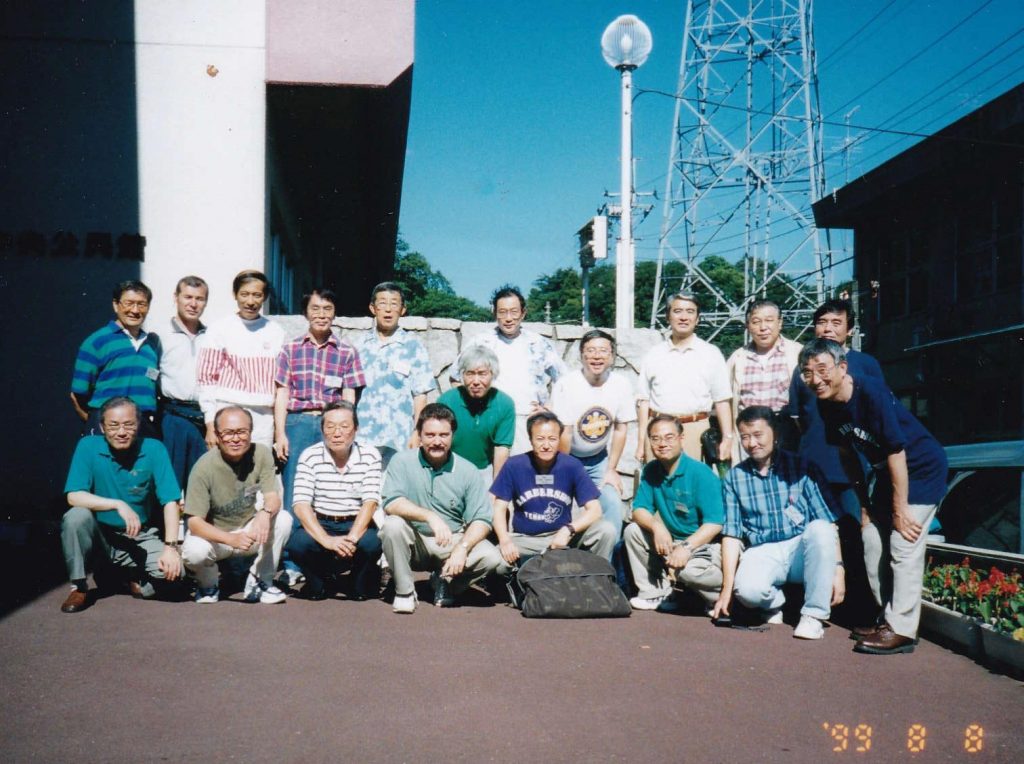ゲイリィ・スタインカンプ(Gary Steinkamp)さんは、1999年から2009年まで、コーチ、そして指揮者として、東京バーバーズをバーバーショップ・コーラスとして育ててくれました。
ゲイリィが東京バーバーズに関わることになったのは、東京バーバーズが初めて参加した海外イベント、ハワイで行われた1998年の環太平洋バーバーショップ大会で、9コーラス中の8位になって、審査員のハンク・ハマーさんから「楽しめる歌い方だったが、バーバーショップらしい響きがしない」と指摘されたことがキッカケです。
当時の東京バーバーズ会長の結城さんが、この少し前までハンクと同じバーバーショップ・ハーモニー協会(Barbershop Harmony Society: BHS)ハワイ支部で肩を並べて歌っていた仲間だったので、誰かよいコーチを教えて欲しいとハンクに頼み込んで紹介して貰ったものです。
紹介されたゲイリィは、BHSの国際大会のカルテット・コンテストで3位になったStanding Room Only(SRO)のテナーで、地元フェニックスのコーラスの指揮者もしており、BHSのコンテストで審査を行える公認審査員でもある実力派です。
第1回目は、成田空港からほど近い佐倉公民館で、8月に一泊二日の合宿。ウォームアップのやり方から、発声の基本的な考え方やハーモニーの作り方、それに簡単な振付まで、当時のレパートリー6曲についてコーチして貰いました。

第2回は、同じ年の10月に、各パート間のバランス、Sing Tall(姿勢は背筋を伸ばし、口の中を縦に開く)、歌詞のさばき方(単語の中の母音を歌う、硬い子音はまるめて歌う、子音のリエゾニング)や、音楽的な歌い方など、バーバーショップらしい英語の歌い方を中心に、コーチを受けました。
最初は2・3回のコーチングの筈でしたが、ゲイリィのコーチ内容が素晴らしかったうえに、米国人らしからぬ控えめな人柄にも惚れ込んでしまった東京バーバーズは、その後10年に亘ってコーチをお願いし、ゲイリィも「東京バーバーズは、昔のバーバーショップ・コーラスの家族的な雰囲気が残っている稀有なコーラスだ。」といって11年間で20回近く、金曜に来て日曜に帰るというハードなスケジュールで来日して、東京バーバーズを育ててくれました。(Kaz 松村)
Gary Steinkamp raised Tokyo Barbers (TB) as a barbershop chorus from 1999 to 2009 as a coach and conductor.
Gary became involved in Tokyo Barbers at the 1998 Pan Pacific Barber Shop Cnvention in Hawaii, the first overseas event that Tokyo Barbers participated in, and was ranked 8th out of 9 choruses by the judges. Hank Hammer (judge) pointed out that “it was a fun way to sing, but it doesn’t sound like barbershop”.
Mr. Yuki, the chairman of Tokyo Barbers at that time, was a friend of Hank, they were singing side by side at the same Barbershop Harmony Society (BHS) Hawaii branch until a while ago, and Yuki asked Hank to intrduce a good coach for TB.
Hank introduced Gary, a tenor of Standing Room Only (SRO) who finished third in the BHS international quartet contest, and a highly talented chorus conductor in the local Phoenix. And also he is a certified judge in the BHS contest.
The first rehearsal by Gary was a two-day, one-night training camp in August 1999 at the Sakura Community Center near Narita Airport. He coached us about the six songs in the repertoire at the time, from how to warm up, to the basic idea of vocalization, how to make harmony, and simple choreography.
In October of the same year, the second rehearsal included balance between each part, Sing Tall (the posture stretches the spine and opens the mouth vertically), and how to judge the lyrics (sing the vowels in the words). We were coached with a focus on English singing, which is typical of barber shops, such as singing hard consonants as a whole, lyricizing consonants) and musical singing.
Initially we were supposed to be coached by Gary a several times, but Tokyo Barbers, fell in love with his modest personality as well as his coaching content, has been coaching for the next 10 years. Gary also said, “Tokyo Barbers is a rare chorus that retains the family atmosphere of the old barber shop chorus.” Nearly 20 times in 11 years, came to Japan on Friday and backed to US on Sunday. He came to Japan in so hard schedules and raised Tokyo Barbers. (Kaz Matsumura)